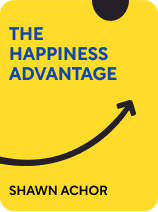

This article is an excerpt from the Shortform book guide to "The Happiness Advantage" by Shawn Achor. Shortform has the world's best summaries and analyses of books you should be reading.
Like this article? Sign up for a free trial here .
What are the best quotes from The Happiness Advantage? How can you reap the benefits of being happy and positive?
In The Happiness Advantage, Shawn Achor shows how being happy and positive has some powerful benefits. Understanding the key quotes from The Happiness Advantage will help you apply his lessons to your own life, promoting improved physical and mental health.
Here are the best quotes from The Happiness Advantage.
The Happiness Advantage: Quotes to Know
The following quotes from The Happiness Advantage highlight some of the key messages from the book about the importance of a positive mindset for health, happiness, and success:
“Habits are like financial capital – forming one today is an investment that will automatically give out returns for years to come.”
As a result of the last few decades of positive psychology research, we now know that the long-standing belief that happiness results from success is wrong—in reality, happiness begets success. The benefits of being happy are deeper than feeling good—happiness has measurable, lasting effects on your mind and body.
“The more you believe in your own ability to success the more likely it is that you will.”
When you implement a positive thinking pattern, you’ll be more likely to notice and capitalize on opportunities, which will contribute to your success, reinforcing your positivity and creating a virtuous cycle.
“Each one of us is like that butterfly the Butterfly Effect. And each tiny move toward a more positive mindset can send ripples of positivity through our organizations our families and our communities.”
Your happiness creates ripple effects that benefit the people around you. Just one positive person on a team unwittingly infects her colleagues with positivity, which increases their individual performances as well as the collaboration and success of the group as a whole.
“Constantly scanning the world for the negative comes with a great cost. It undercuts our creativity, raises our stress levels, and lowers our motivation and ability to accomplish goals.”
We’ve discussed the benefits of positivity and some strategies to raise your happiness, but sometimes the biggest obstacles are your own persistent, negative thoughts. Think of your mind as a seesaw. If a light person sits on one end and a heavy person sits on the other, the heavy person will be on the ground while the light person will be suspended in the air. However, if you place the fulcrum (the center point on which the lever balances) closer to the heavy person, that person will be easier to lift. When it comes to being happier, if your mind is entrenched in negative thought, it’s like moving the fulcrum away from the heavy object—it becomes very difficult to lift. On the other hand, if you focus on more positive thoughts, you leverage the power of your fulcrum by moving it closer to the heavy object, and your power for positivity is unbounded.
“Happiness is not the belief that we don’t need to change; it is the realization that we can.”
If happiness correlates with success, what does that mean for people who simply are not wired to be happy? It turns out, anyone can change their thinking and behavior with some practice, despite the fact that people tend to overestimate the extent to which biology is fixed. Indeed, for most of the 20th century, the scientific community broadly believed that human brains only grow from birth through adolescence, after which the brain’s capacity is fixed. But over time, new studies started to challenge that assumption.
“Without action, knowledge is often meaningless.”
The human brain has the capacity to adapt and grow to an extent that is still unknown. The seven principles from The Happiness Advantage will help you to make the most of this potential and enjoy the vast benefits of positive thinking. However, this requires more than a positive attitude—it calls for you to take actions to change your thinking and behavior. Rather than donning rose-colored glasses and ignoring your problems, these principles empower you to:
- Conquer your challenges.
- Be more productive and efficient.
- Capitalize on opportunities.
- Break bad habits.
- Achieve lofty goals.
“We’ve all heard the usual examples: Michael Jordan cut from his high school basketball team, Walt Disney fired by a newspaper editor for not being creative enough, the Beatles turned away by a record executive who told them that “guitar groups are on their way out.” In fact, many of their winning mantras essentially describe the notion of falling up.”
Instead of seeing failure as something to avoid or endure, when you learn to fall up, failure becomes an invaluable opportunity for growth. When you fall down, don’t simply get back up and return to the status quo—take a deliberate approach to your challenge and fall up to greater heights. Successful people and organizations frame failure as a stepping stone to greatness, and one that forces them to:
- Be more creative to work around obstacles
- Accelerate their learning to find alternative routes and solutions
- Increase their competitiveness to avoid getting snagged on the same hurdles in the future
“The fastest way to disengage an employee is to tell him his work is meaningful only because of the paycheck.”
Not only does social connection prevent employees from being impeded by stress, but it also expands their mental capacity and productivity. Social bonds:
- Increase innovation and creativity
- Correlate with employees’ individual learning behavior, meaning that they invest more time in trying to improve their skills and efficiency
- Motivate workers (more than the promise of money and status)
- Increase employee engagement
- Prolong employees’ ability to focus
“When we are happy—when our mindset and mood are positive—we are smarter, more motivated, and thus more successful. Happiness is the center, and success revolves around it.”
The benefits of being happy are deeper than feeling good—happiness has measurable, lasting effects on your mind and body:
- Positive emotions release dopamine and serotonin, which make you feel good while also activating your brain’s learning centers. This effect improves your ability to think quickly and creatively, analyze, problem-solve, organize and store new information, and be open to new ideas.
- Positive emotions also reduce stress and anxiety in a phenomenon psychologists call “the undoing effect.” Some amount of stress is inevitable in life and in work, but when a stressful situation is imminent—for example, you have to make a presentation at an important meeting this afternoon—you can mitigate that stress by focusing on happy memories or watching a funny video.
- Happiness improves your physical health. In one experiment, researchers surveyed participants about their levels of happiness, and then injected them with the cold virus. The following week, researchers found that the happier participants fought off the virus more quickly and had fewer objective symptoms than their less happy peers.
“When you write down a list of “three good things” that happened that day, your brain will be forced to scan the last 24 hours for potential positives—things that brought small or large laughs, feelings of accomplishment at work, a strengthened connection with family, a glimmer of hope for the future.
Recognizing and having gratitude for the good in your life is actually the best mechanism for creating more positive outcomes. This can raise your emotional intelligence and energy, while lowering anxiety, loneliness, and depression.
The above quotes from The Happiness Advantage will help you achieve incredible benefits in your personal and professional life.

———End of Preview———
Like what you just read? Read the rest of the world's best book summary and analysis of Shawn Achor's "The Happiness Advantage" at Shortform .
Here's what you'll find in our full The Happiness Advantage summary :
- How happiness isn’t the result of success, it’s the cause of it
- The benefits of happiness—from increased creativity to improved health
- Strategies for adopting a positive mindset and raising your happiness baseline






